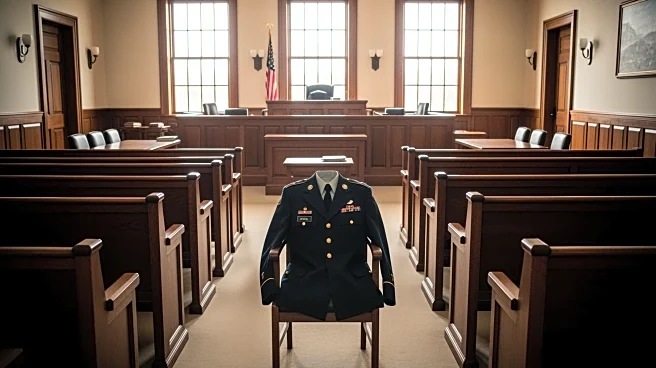What's Happening?
Supreme Court Justice Clarence Thomas has expressed dissent regarding the Court's decision not to revisit the Feres doctrine, a legal precedent established 75 years ago. The doctrine, originating from the 1950 case Feres v. United States, generally prevents
military personnel from suing the U.S. government for injuries related to their service. Thomas criticized the doctrine for causing confusion and depriving service members and their families of legal recourse for serious harms. The case in question involved Kari Beck, who sued the U.S. government after her husband, Air Force Staff Sergeant Cameron Beck, was killed in a collision with a government vehicle driven by a distracted federal employee. Despite the circumstances, lower courts dismissed the claim based on the Feres doctrine. Thomas argued that the doctrine lacks a basis in the Federal Tort Claims Act's text and called for its reevaluation.
Why It's Important?
The Feres doctrine has significant implications for military families seeking justice for non-combat-related injuries or deaths. Justice Thomas's dissent highlights ongoing concerns about the doctrine's fairness and applicability, particularly in cases unrelated to military service. The doctrine's broad interpretation has barred claims for medical malpractice, sexual assault, and other incidents occurring on U.S. soil. Justice Sonia Sotomayor also acknowledged the doctrine's problematic nature, suggesting that Congress should address these statutory issues. The refusal to hear the case means the lower court's decision stands, continuing to limit legal options for affected military families. This situation underscores the need for legislative action to ensure fair treatment and access to justice for service members and their families.
What's Next?
With the Supreme Court declining to hear the case, the lower court's ruling remains in effect, maintaining the status quo under the Feres doctrine. Justice Thomas's dissent may prompt further discussions among lawmakers and legal experts about potential reforms. Congress holds the authority to amend the doctrine, and Justice Sotomayor's statement calls for legislative attention to rectify its unfair consequences. Advocacy groups and military families may increase pressure on Congress to address these issues, potentially leading to hearings or proposed legislation aimed at reforming the doctrine. The ongoing debate may also influence future Supreme Court considerations if similar cases arise.
Beyond the Headlines
The Feres doctrine's impact extends beyond individual cases, affecting the broader legal landscape for military personnel. Its interpretation raises ethical questions about the balance between sovereign immunity and individual rights. The doctrine's limitations on legal recourse for non-combat-related incidents challenge the principles of justice and accountability within the military system. Long-term shifts may include increased advocacy for legal reforms and heightened scrutiny of military-related legal doctrines. The case highlights the intersection of military service, legal rights, and governmental accountability, prompting discussions about the ethical obligations of the state towards its service members.
















